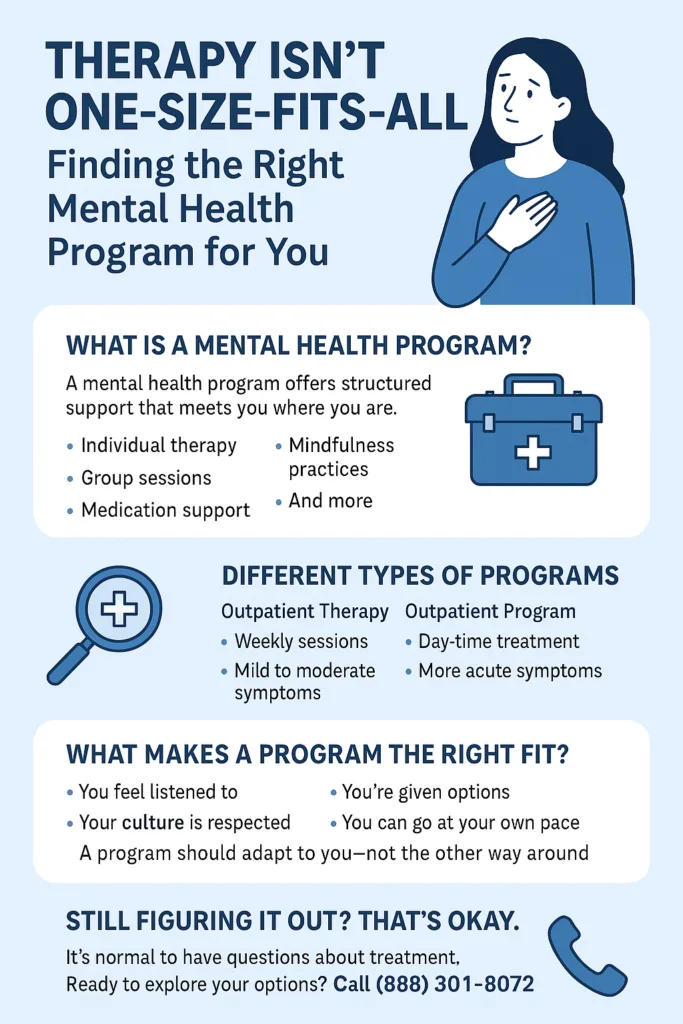Starting therapy for the first time can feel like stepping into a world with its own language. What’s the difference between outpatient and intensive outpatient? Do you need to take medication? What if you’re just not ready?
At Greater Boston Behavioral Health, we believe that mental health support should feel like a conversation—not a test. You don’t have to know all the answers before you begin. You just need to know you’re ready for things to feel a little different.
Here’s what you need to know about finding a mental health program in Boston that works for you.
What Is a Mental Health Program?
A mental health program is a structured approach to mental wellness. It offers more than just therapy—it includes layers of support that meet you where you are and help you move forward.
Depending on your needs, a program might include:
- Individual therapy sessions
- Group therapy or skills training
- Psychiatric evaluation and medication support
- Family counseling or educational workshops
- Creative or mindfulness-based therapies
- Crisis support and case management
Think of it as a toolkit. Some days, you’ll need a conversation. Other days, you’ll need coping strategies or medication. A good program helps you build the mix that fits.
Different Types of Mental Health Programs in Boston
Boston is home to a wide range of mental health services—but it’s not always easy to know where to start. Here’s a breakdown of common options:
Outpatient Therapy
Best for: Mild to moderate symptoms, stable schedules, early exploration
Outpatient therapy typically involves weekly or bi-weekly one-on-one sessions with a licensed therapist. It’s flexible, private, and great for building a strong foundation.
Intensive Outpatient Program (IOP)
Best for: People needing more frequent support without inpatient care
IOPs usually involve 3–5 sessions per week and combine group and individual therapy. They’re designed for people who are struggling with symptoms but still managing daily life.
Quick Tip: IOPs can also be a great fit for people recently diagnosed who want to understand their symptoms better in a supportive environment.
Partial Hospitalization Program (PHP)
Best for: More intense or acute symptoms without full hospitalization
PHPs offer structured day programming (usually 5 days/week), providing comprehensive care while allowing you to return home in the evenings.
Psychiatric Services and Medication Management
Best for: People exploring whether medication could help
You don’t have to be “ready” for medication to meet with a psychiatrist. These appointments are exploratory and collaborative—focused on understanding your needs and giving you time to ask questions.
At Greater Boston Behavioral Health, we never push medication. Instead, we offer clarity, choices, and support.
Scared About Medication? That’s Okay.
If you’re newly diagnosed with depression, anxiety, bipolar disorder, or another condition, the idea of taking medication might feel scary—or even threatening to who you are.
That fear is valid.
We’ve heard clients say things like:
“What if it changes my personality?”
“What if I lose my creativity?”
“What if I start and then can’t ever stop?”
These questions deserve thoughtful answers. Medication can be a helpful part of treatment—but only when you feel safe, informed, and in control. We’ll work with you to decide if it’s the right fit, when you’re ready.

What Makes a Program the Right Fit?
No program is perfect for everyone. But the right one should feel like it sees you—not just your diagnosis.
Here are some signs you’re in the right place:
- You feel listened to, not rushed
- You’re offered options, not ultimatums
- Your culture, identity, and background are respected
- You’re supported in asking questions, changing your mind, or going slow
- You leave sessions feeling clearer—not more confused
A mental health program should adapt to you—not the other way around.
How We Support Newcomers at Greater Boston Behavioral Health
Starting care can feel vulnerable. That’s why we’ve designed every step—from your first phone call to your first session—to be grounded in clarity and care.
- Your intake is a conversation. We ask questions, but we also listen. No pressure to say everything perfectly.
- We give you time. Whether you’re ready to start right away or just gathering info, we’ll match your pace.
- We explain every option. Not sure what an IOP is? Wondering about therapy styles? We walk you through it in plain language.
- We check in. Your needs might shift. We’re ready to adjust your care plan with you.
Frequently Asked Questions About Mental Health Programs
How do I know if I need a mental health program?
If your symptoms are interfering with work, school, relationships, or daily functioning—or if you’re just feeling unlike yourself—it’s worth exploring. You don’t have to be in crisis to benefit from support.
Do I have to take medication?
No. Medication is one tool, not the only one. We’ll help you understand your options so you can make a choice that feels right.
What’s the difference between therapy and a mental health program?
Therapy is often one part of a broader mental health program. Programs usually include multiple services—like group sessions, psychiatric support, and skill-building activities.
How long do programs last?
It depends on the level of care. Outpatient therapy might be open-ended, while IOP or PHP often runs for 4–8 weeks. We’ll talk about duration and goals together.
Can I keep my job or go to school while in a program?
Yes—especially in outpatient and IOP programs, which are designed to fit around daily life. We’ll help you find a schedule that works.
Is everything confidential?
Yes. Your privacy is protected by law. We’ll never share your information without your consent, except in rare legal exceptions (e.g., safety concerns).
Still Figuring It Out? That’s More Than Okay.
Starting therapy—or even just asking questions—takes courage. Especially when you’re still wrapping your head around a diagnosis or wondering whether treatment will change you.
You’re allowed to move slowly. You’re allowed to be unsure.
And you’re allowed to choose a mental health program that respects both.
Ready to Talk?
Whether you’re feeling overwhelmed, newly diagnosed, or just want to understand your options, Greater Boston Behavioral Health is here to help. Call us at (888) 301-8072 to start a conversation—not a commitment.
Learn more about our mental health programs in Boston, MA.

